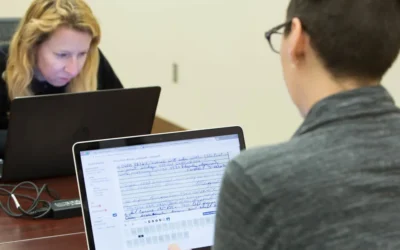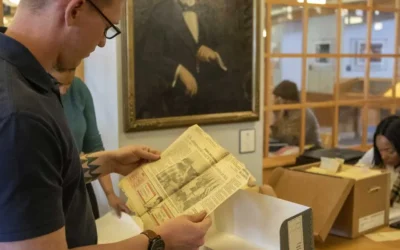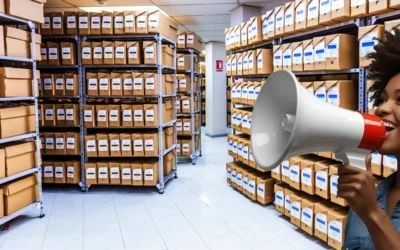The Business Case for Archival Digitization
Margot Note
If done correctly, digitization can help archival repositories become more user-centric and higher performing.
Archivists can accelerate their gains from digitization by presenting a business case for digital transformation to those who lead their organizations.
To do so, archivists should always start digitization projects with their end goals in mind. They must consider what they are trying to accomplish and build a strategy based on those discoveries. Only when they have defined the objectives for the project can they start to determine how they will reach them. Archivists should set their goals first and build strategies with the organization’s support.
Prestige through Partnerships
Decision-makers within organizations can often be persuaded to support archives programs and digitization projects if they understand how doing so can offer the organization status and prestige through relationships with users, donors, and institutions.
For example, archivists may entice holders of valued collections to bequeath those collections to a repository because of digitization. When an individual or organization looks to donate a collection, they are motivated by various goals. In most cases providing public access to the collection and protecting the collection are high priorities. An institution with the capacity to demonstrate a track record of providing digitization can offer strong assurance of both access to and protection of the collection.
Digitization also raises the profile of institutions. Institutions that allow specialized and generic search engines to locate the materials in their digital collections and participate in cross-institution efforts like the Digital Public Library of America will have their results listed with holdings from esteemed institutions like the Library of Congress.
Small institutions may have a world-class collection of niche topics and can leverage the digitization of those collections to increase their research globally. With larger institutions, a researcher often starts with the institution and discovers and learns about a particular collection. However, the opposite is often true with smaller institutions: a researcher finds a collection and then learns about the institution and community access to that collection, and as a result, increases the visibility of the institution itself, bringing tangible, worldwide recognition to its collections.
Investment in Digitization
Investing in resources is an important part of digitization, but it is not the only component. If archivists add digitization to the same processes and practices they have used, they will continue to experience the same productivity and performance issues encountered in other projects. However, if archivists treat digitization as an opportunity for profound, fundamental improvements in how users search, find, and share information, archivists will realize the transformative power of digitization.
Digitization projects are unsuccessful without colleagues who know how to get the most out of their results. Archivists should take a two-pronged approach to connect people and digitization. First, they should rely on colleagues with technical skills to guide the project and choose tools designed to be intuitive for the less tech-savvy to understand.
Archivists want to create a culture where everyone brings awareness and skill to their jobs across the organization. Hiring new people based on talent and training existing employees to strengthen their digital capabilities is a viable approach.
Seeking Big Wins
Digitization can potentially transform every part of a repository and its workflow. While it is important to see the organization holistically and to pursue improvements across collections, archivists do not have to digitize everything at once. As part of their digitization strategy, archivists should identify areas where the organization will benefit most from digitization. Then archivists should balance that against where they can make significant changes quickly. This will help shape the thinking about ongoing initiatives and guide the investments in an enabling digital infrastructure to support them.
Archivists also must decide what issues digitization can improve, prioritize, and evaluate every potential project against those criteria. Whatever the goal, archivists must establish criteria to ensure digitization will move organizations toward that future state.
Margot Note
If you’re interested in this topic and eager to learn more, please join us for “Making the Case for Digitization”, the first in a new series being presented by Margot Note. It’s on Wednesday, January 25, 2023 at 11 a.m. Pacific, 2 p.m. Eastern. (Can’t make it? Register anyway and we’ll send you a link to the recording and slides afterwards). Register now or call 604-278-6717. And check out ArchivEra, our archival collections management software built for today’s challenges and tomorrow’s opportunities.
Never miss another post. Subscribe today!
Similar Posts
Collaborative Archival Relationships
Collaborative projects are instrumental in showcasing how archival collections can benefit various organizational departments.
Informational, Evidential, and Intrinsic Values within Archives
Archives provide authentic, reliable information and hold values that reflect their functions and uses; informational, evidential, and intrinsic.
A Sustainable Archives
Archivists prioritize sustainable practices and policies, rooting their work in ethics of care, often preferring digital processing and preservation
Archival Branding and PR Strategies
Archivists who adopt branding and PR strategies both safeguard historical treasures and contribute to their organizations’ evolution.




Leave a Comment
Comments are reviewed and must adhere to our comments policy.
0 Comments